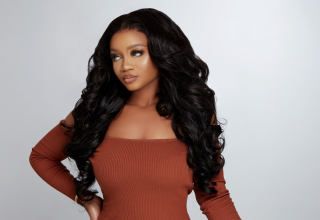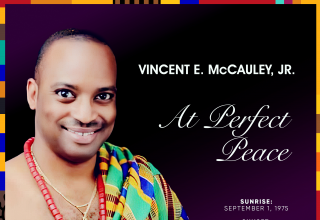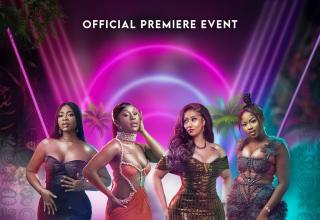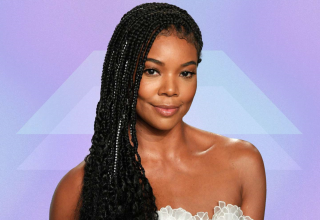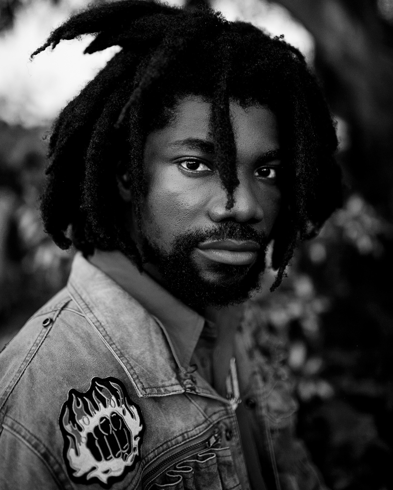
His words flow like butter, as easy as a Sunday breeze in Accra. A live band is playing soft highlife melodies with intoxicating drum rhythms. The crowd knows every word, every line of his songs, that are written in his mother language Twi, by heart- whether they understand it or not. Pure Akan is not the rapper you meet every day. He’s an icon, from his style to his music and his visuals, everything is perfectly in tune with each other down to the very last detail. His lyrics are poetry, his messages that circulate around his personal life experiences, Pan Africanism, the celebration of black identity and detachment from colonial mindset, are crucial. This is Pure Akan. We talked to the young Ghanaian artist, who has already established his legend status, to learn more about his music, his upcoming album and the personality behind his brand.
Pure Akan, namely Nana Appiah grew up in an era, when Hiplife was just breaking the charts and blasting through all radio stations. He was inspired by classic Hiplife stars like Obrafour, Okomfo Kwadee and his family early introduced him to Highlife musicians like Ampadu.
“Music has always been a tool to express myself and to communicate and interact with my environment, people around me. I always see it as a means to express and address my ideas and the way I see things around me.”, he explains.
Meanwhile many artists choose to sing in Pidgin, also to appeal more to an international audience, Pure Akan writes only in Twi.
“It’s an amazing saying, that, because of how powerful music is, it has the power to overtake the idea of language being a barrier. I mean I have people from all backgrounds at my music, I have people from different-let’s-say-races being at my concerts, being my fans. Sometimes I ask them if they understand what I say and they say, they don’t understand, but they can feel it, they know I’m saying something. They just don’t understand what I’m saying by word but they are feeling that I’m communicating something to them.”
Still, it is a beautiful thing to understand his song texts, as Pure Akan is a true story teller, that lets people have deep insight into his intimate thoughts, experiences and emotions.
“I’m mostly inspired by the things that go around in my environment and I’m drawn to sharing. I always aspire to share my music with people, to share my ideas with people, the things I’m passionate about, the things that I learn, the things that I read, with hopes to inspire people, to let people do great things, to let people have good understanding of themselves and their environment, to get happy, to entertain people, to inform.”
If you haven’t heard of Pure Akan before, you’re definitely missing out – to give you an idea, he sees eye to eye with Ghana’s star Sarkodie, who revolutionized Hip Hop in Africa, influencing music far behind his country’s borders. Which you can most easily hear on their collaboration on “All die be die” It’s just one of his top tier cooperations, followed by songs with Efya, Kwesi Arthur, Juls and Worlasi.

Just like Sarkodie did, Pure Akan believes that his music and Highlife/Hiplife music in general can indeed blow up behind Ghanaian borders, maybe even African borders.
“It has always been possible. A few years ago, we had Mafiki Zolo from South Africa, that released “Kona” and it was all over the place and there’s also a new one “Jerusalema” from South Africa, that is also doing amazing, they had a Remix with Burna Boy. I can barely understand what they are saying, but it’s all over the place. I think you need to find a good song, once you have a good song that people can connect with, it could be anything, the rhythm, the beat or the lyrics, that people want to connect to. You have a good promotion, good marketing, a team behind you to promote the music to the right people – if you do that, I believe, you can work magic.”
Pure Akan is already working magic with his unique sound and incredible rhyming skills.
He doesn’t only share his life stories, but he is keeping original Akan music and the history of his people alive. His 2018 song “Saa Ara” featuring Producer Juls and star-rapper Kwesi Arthur is the best example for his mission. The music video was shot at Cape Coast Castle, the place where once slaves were traded.
“Saa ara” touched on everyday life – “Saa ara”, the same thing every day, the same old story – it’s another day and the same hustle. “Saara sara sara Na ade3kye” – “Na ade3kye” means “a new day”. Juls had the idea of Cape Coast Castle, which has a lot of history behind it, as the meeting of black people and white people is concerned – the hustle that comes with it, that can be related to the hustle that we have everyday life. Juls suggested that we can use the cape coast castle to represent what we still go through.”
Meanwhile Pure Akan sings about the struggle of his people due to decades of colonization, he radiates African pride and joy, that he finds in the lively Ghanaian culture, in every song he performs.
“I take pride in where I come from. The reason why I write and perform mostly in Twi, is that I take pride in where I’m from. I think it’s happening. Like people are already with time accepting who they are and where they are from.”
Ghana was one of the very first countries in Africa to gain independence from their oppressor, with the leadership of famous Pan Africanist and anti-imperialist Kwame Nkrumah.
Still, Pure Akan feels the late impact of colonialism and the need to process it through his music:
“I come from a place, where most people were less favoured, like even in Ghana, you be in a queue and a light skin person will come and will get served before you get served. It is a matter, it happens. I wanted to go to this place and before I could enter, I had to be searched, I had to take off my hat…the next time I came with a friend who was light skinned and we easily passed in and I was like “Oh shit. It’s really happening.” Like it got me thinking, why is this happening, why am I being less favoured or why am I not being treated as the same person, who looks just as beautiful as I am? So, it got me thinking, what could possibly be the problem. Working on my upcoming project, those were also some of the things I touched on, the questions that I asked myself during the process. Why can’t we be treated equally? Even in my home country – in MY country I should be treated nicely or at least fairly. But instead, you sometimes get treated like less of a person. It made me question a lot of things.”
He thinks that by understanding your history and finding pride in your roots, people can actually decolonize their mind as well.
“I think it’s by educating people, we simply have to educate them. And I am happy to use my music as a means, as a tool to educate people and inform people. Let them know, that there’s no difference, we are all one people, we have different skin tones and different skin colours because of the environment we find ourselves in, nothing more nothing less, we are all one beautiful people and we should all be treated as one, simple as that. So, I am happy to educate and inform people, most importantly in their mother tongue, which is the Twi, which a lot of us speak here, I think it’ll also do good, because people will be able to understand and connect with it more.”

Pure Akan is a poet that explores various facets of life – unlike some of the music that is trending in Ghana right now, in which the artists are keeping the lyrics rather simple sometimes. When asked about how he connects with it, he says:
“I totally love it. It’s music for a different purpose. I think there’s music for different purposes – we have music for dance, music to meditate, music to relax and to think. I look at us as a team and everybody’s supposed to play their position. We can’t listen to moody songs all the time, we need high tempo songs. I think they are doing amazing. I listen to their songs all the time.”
And there is more we can look forward to: His third studio album is on the way:
“We are a hundred precent done. As far as the music is concerned, we are waiting to clear some samples, so we are still in talks with the right owners to make sure we can release them. So far everything is done, recording done, mixing done. It means a lot to me; I truly believe it’s something I was supposed to do and people are excited and I’m excited as well!”
by: Rebecca Steinmaßl for Glitz Africa

